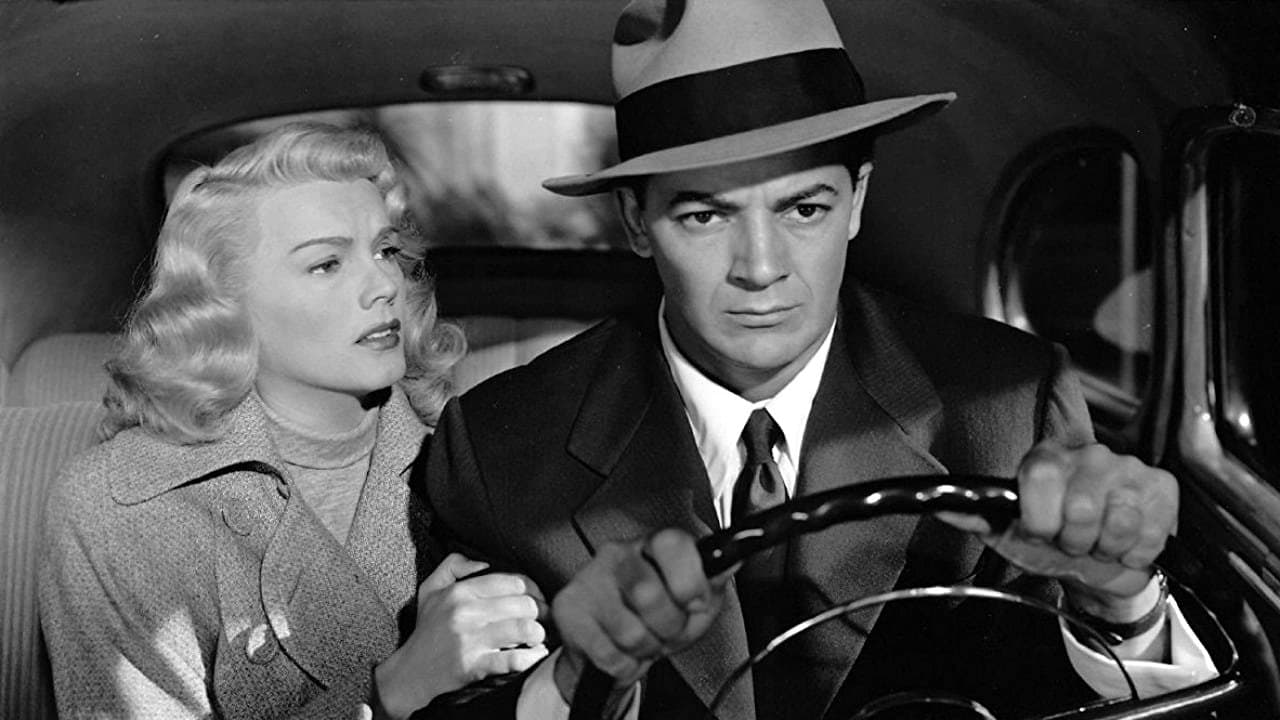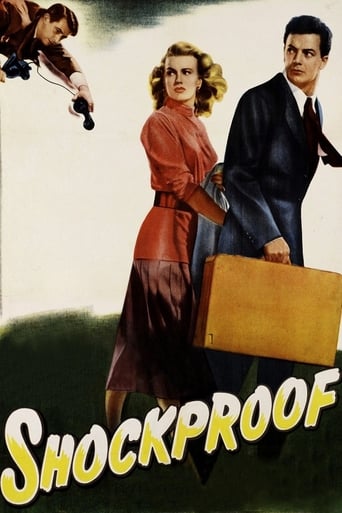

Strong and Moving!
... View MoreBlending excellent reporting and strong storytelling, this is a disturbing film truly stranger than fiction
... View MoreThe movie's not perfect, but it sticks the landing of its message. It was engaging - thrilling at times - and I personally thought it was a great time.
... View MoreThis movie feels like it was made purely to piss off people who want good shows
... View More"Shockproof" is notable for being written by Sam Fuller and directed by Douglas Sirk, two cinematic heavyweights. Having such good credentials, it's a shame that the resultant film, at least in its final 40 minutes, turns into such a bland noir.Cornel Wilde plays Griff Marat, a smooth parole officer who falls in love with his parolee, the sultry Jenny Marsh. The first act of the film is brilliant, Marat navigating his office building with slick efficiency, bouncing from office to office, orchestrating interviews, plans and scheming his way inside Jenny's head.He's fallen madly in love with her, the problem is, parol officers aren't allowed to fraternize with their parolees. Bigger still, Jenny may still be in love with her convict boyfriend.And so Griff organises for Jenny to work at his home, tending to his blind mother. This way he can keep her safe, courting her in the secluded comfort of his own home.But does Jenny genuinely love Griff? Does she still have feelings for her boyfriend? Or is she simply using his kindness for her own sinister purposes? By the film's midway point we hardly care. Sam Fuller's original script was cut in half by the studios and a new ending, written by Helen Deutsch, was used instead. What could have been a hard boiled noir, two lovers fighting a system built to keep them apart, turms into a sappy pile of crap.5/10 - Like most noirs, this one falls apart after the first 30 minutes.
... View MoreIf the movie were an airplane, then it wobbled a lot before finally crashing and burning with an utterly illogical ending. Up to that point, this crime drama is mediocre at best. The best part follows the couple (Wilde and Knight) as they flee the cops after running out on Knight's parole and in the process sinking into society's lower depths. That 20 minute sequence is done with both flair and zip. Director Douglas Sirk is known for artistic soap opera, so it's not surprising that this film emphasizes the love story over the crime element. The trouble is that Wilde is woodenly uninvolving, while Knight's character remains muddled, to say the least. A key part of the plot lies in tracking her evolving emotions. But that's hard to do since these developments are confusingly portrayed, helped neither by the turgid script nor by Knight's thespic limitations. Apparently cult movie-maker Sam Fuller co-authored some of the screenplay, which, on the face of it, seems hard to believe. Nonetheless, I'm sure he had nothing to do with the ridiculous climax that instead smacks of outside interference of the most thoughtless kind.Calling this a noir film is, I think, a stretch. It's certainly not filmed as noir, with none of the usual trademark light and shadow. True, the plot contains a number of noirish elements, but Sirk's style doesn't bring these out in recognizably noir fashion. Even so, the many SoCal location shots are both entertaining and appropriate for crime drama. (Too bad we don't get more of the dingy oil field setting, which has definite and exotic noir potential.) But noir or not, this is a rather poorly done crime drama, having neither the force nor the panache of the better examples of the period. With better casting, a more cogent screenplay, and more attention to the oil field, this could have been a memorable film.
... View MoreLike other early Douglas Sirks, this noir doesn't delve very far into his later themes of American hypocrisy or false values, and it has none of the visual flair for which he became known. It's just a mild, casually plotted melo about a parole officer who falls for his charge and ends up on the lam with her. Wilde, though he was then married to his pretty leading lady, Patricia Knight, doesn't seem very interested in her, and the rest of the no-name cast is trapped in a web of poor character motivations and listless dialog. The resolution is, as another poster noted, hilariously out of left field -- that character would never do that. On the plus side, we get some nice shots of 1948 L.A., and a few scenes in an oil field camp with one-room worker shacks feel authentically gritty and mid-century. But as a romance, it's unconvincing, and as a noir, it's without thrills.
... View More"Shockproof" is a 1949 Douglas Sirk film starring Cornel Wilde and Patricia Knight. Wilde is Griff Marat, who gets a paroled prisoner, Jenny Marsh (Knight) on his caseload. She refuses to give up the bad acquaintances that got her into trouble in the first place; this includes her old boyfriend, Harry (John Baragrey) whom she continues to meet secretly. Griff has taken Jenny into his home to care for his blind mother (Esther Minciotti), and over time, they fall in love. Though she's still pulled toward Harry, she balks when Harry wants her to convince Griff to marry her, a clear violation of his job ethics and her parole. Because Griff has political ambitions, they will then have them where they want him. Gradually Harry realizes that Jenny is not going to cooperate, and he ends up gravely injured. Griff and Jenny go on the run to avoid her arrest.This is a pretty good noir with two heavyweights attached, Sirk, the director, and Sam Fuller, who co-wrote the script. Unfortunately, the characters aren't fleshed out enough so that we understand their sudden turnarounds - a man on the side of the law with political ambitions decides to throw it all out the window, marry a client secretly, and go on the run riding in boxcars and living in shacks because though the shooting was accidental, Griff feels Jenny won't be believed. That's just Griff - in reality, all three of the main characters do complete reversals during the course of this film with little or no justification.Wilde does a good job here, and Knight, a new actress to me, is beautiful and has good chemistry opposite her then husband Wilde. She didn't work much longer, as after their divorce, her career dried up.Entertaining.
... View More